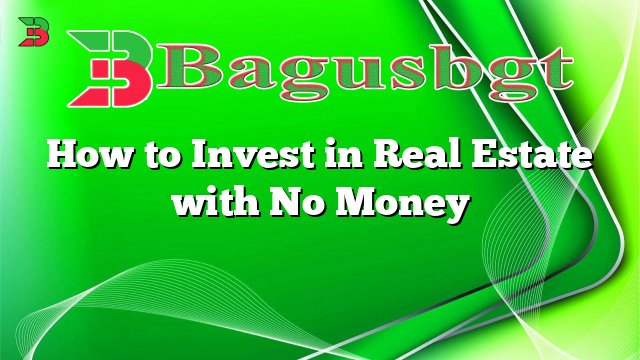Hello and welcome to our guide on how to invest in real estate with no money. Many people believe that investing in real estate requires a large amount of capital, but the truth is, there are strategies that can help you get started in the real estate market without spending your own money. In this article, we will explore various techniques and alternatives that can help you achieve your real estate investment goals.
1. Partner with Someone
One of the most effective ways to invest in real estate with no money is by partnering with someone who has the financial resources. Find a partner who is interested in real estate investing and is willing to provide the capital while you bring in your knowledge, skills, and time. This way, you can leverage each other’s strengths and create a mutually beneficial partnership.
Advantages:
- Access to capital without personal investment
- Ability to learn from an experienced partner
- Shared responsibilities and workload
Disadvantages:
- Need to find a trustworthy and compatible partner
- Sharing profits and decision-making power
- Potential conflicts and disagreements
2. Utilize Other People’s Money (OPM)
Another approach is to utilize other people’s money to invest in real estate. This can be done by seeking funding from private lenders, crowdfunding platforms, or even family and friends. Present a solid investment plan and demonstrate how the investment will generate returns for the lender.
Advantages:
- No need for personal funds
- Potential access to larger amounts of capital
- Opportunity to build relationships with lenders
Disadvantages:
- Interest rates or profit sharing with lenders
- Risk of damaging personal relationships
- Need to convince lenders of the investment’s potential
3. Wholesaling
Wholesaling involves finding discounted properties and then assigning the contract to another buyer for a fee. In this strategy, you don’t actually need money to purchase the property, as you are acting as a middleman. The key is to find motivated sellers and negotiate favorable deals.
Advantages:
- No need for personal funds to purchase properties
- Quick turnaround and potential for fast profits
- Opportunity to develop negotiation and marketing skills
Disadvantages:
- Requires extensive research and market knowledge
- Reliance on finding motivated sellers
- Risk of not finding a buyer for the assigned contract
4. Lease Options
A lease option allows you to control a property by leasing it from the owner with an option to buy at a predetermined price within a specified timeframe. This strategy can be beneficial if you find a property with potential appreciation and can secure a long-term lease agreement.
Advantages:
- No need for a large upfront investment
- Potential for property appreciation
- Ability to generate immediate cash flow through subleasing
Disadvantages:
- Need to find a motivated property owner
- Responsibility for property maintenance and repairs
- Risk of the property not appreciating as expected
5. Seller Financing
Seller financing occurs when the property owner acts as the lender and provides financing to the buyer. This can be a mutually beneficial arrangement, as it allows the buyer to invest in real estate without traditional financing, while the seller receives steady cash flow from the mortgage payments.
Advantages:
- No need for a bank loan or personal funds
- Potential for more flexible terms and conditions
- Opportunity to negotiate a favorable purchase price
Disadvantages:
- Dependence on the seller’s willingness to finance
- Potential for higher interest rates
- Risk of default if unable to make mortgage payments
6. Hard Money Lenders
Hard money lenders are private individuals or companies that provide short-term loans secured by real estate. These loans typically have higher interest rates, but they can be an option for investors who are unable to qualify for traditional bank loans.
Advantages:
- Potential access to quick financing
- Easier qualification process compared to traditional loans
- Ability to secure deals that require immediate cash
Disadvantages:
- Higher interest rates and fees
- Short repayment periods
- Risk of losing the property if unable to repay the loan
7. Real Estate Investment Trusts (REITs)
A REIT is a company that owns, operates, or finances income-generating real estate. By investing in a REIT, you can indirectly invest in real estate without the need for a large capital outlay. REITs offer the opportunity to diversify your investments and earn regular dividends.
Advantages:
- No need to directly own or manage properties
- Access to a diversified portfolio of real estate assets
- Potential for regular dividend income
Disadvantages:
- Lack of control over property selection and management
- Potential for lower returns compared to direct real estate investing
- Dependence on the performance of the REIT and real estate market
8. Joint Ventures
Joint ventures involve partnering with other investors to pool resources and invest in real estate projects together. Each partner contributes their expertise, time, or capital to the venture, allowing for larger and more profitable investments.
Advantages:
- Ability to take on larger and more lucrative projects
- Sharing of risks and expenses
- Opportunity to learn from experienced partners
Disadvantages:
- Need to find compatible and trustworthy partners
- Potential conflicts and disagreements
- Sharing of profits and decision-making power
9. Sweat Equity
Sweat equity involves investing your time, skills, and effort into a real estate project in exchange for a share of the profits. This can be a viable option if you have the necessary expertise and are willing to put in the work required to make the investment successful.
Advantages:
- No need for personal funds
- Potential for higher returns based on your contribution
- Opportunity to gain valuable experience and knowledge
Disadvantages:
- Significant time and effort required
- Risk of not receiving the expected share of profits
- Potential for burnout or overcommitment
10. Creative Financing Options
There are various creative financing options available, such as subject-to deals, private money loans, self-directed IRAs, and more. These methods require thorough research and understanding of the legal and financial implications, but they can provide opportunities for investing in real estate with little to no money.
Advantages:
- Flexibility in financing options
- Potential for unique and profitable deals
- Ability to tailor financing to specific investment goals
Disadvantages:
- Complexity and potential legal and financial risks
- Need for specialized knowledge and expertise
- Risk of unfavorable terms or conditions
Alternative Approach: Real Estate Crowdfunding
If the methods mentioned above don’t align with your investment goals or preferences, real estate crowdfunding can be an alternative option. Real estate crowdfunding platforms allow multiple investors to pool their funds and invest in real estate projects together. This approach offers diversification, lower investment minimums, and the ability to choose specific properties or projects to invest in.
Advantages:
- Access to a wide range of real estate projects
- Diversification of investment portfolio
- Lower investment minimums compared to traditional real estate investing
Disadvantages:
Summary of How to Invest in Real Estate with No Money
Strategy |
Advantages |
Disadvantages |
|---|---|---|
Partner with Someone |
Access to capital without personal investment Ability to learn from an experienced partner Shared responsibilities and workload |
Need to find a trustworthy and compatible partner Sharing profits and decision-making power Potential conflicts and disagreements |
Utilize Other People’s Money (OPM) |
No need for personal funds Potential access to larger amounts of capital Opportunity to build relationships with lenders |
Interest rates or profit sharing with lenders Risk of damaging personal relationships Need to convince lenders of the investment’s potential |
Wholesaling |
No need for personal funds to purchase properties Quick turnaround and potential for fast profits Opportunity to develop negotiation and marketing skills |
Requires extensive research and market knowledge Reliance on finding motivated sellers Risk of not finding a buyer for the assigned contract |
Lease Options |
No need for a large upfront investment Potential for property appreciation Ability to generate immediate cash flow through subleasing |
Need to find a motivated property owner Responsibility for property maintenance and repairs Risk of the property not appreciating as expected |
Seller Financing |
No need for a bank loan or personal funds Potential for more flexible terms and conditions Opportunity to negotiate a favorable purchase price |
Dependence on the seller’s willingness to finance Potential for higher interest rates Risk of default if unable to make mortgage payments |
Hard Money Lenders |
Potential access to quick financing Easier qualification process compared to traditional loans Ability to secure deals that require immediate cash |
Higher interest rates and fees Short repayment periods Risk of losing the property if unable to repay the loan |
Real Estate Investment Trusts (REITs) |
No need to directly own or manage properties Access to a diversified portfolio of real estate assets Potential for regular dividend income |
Lack of control over property selection and management Potential for lower returns compared to direct real estate investing Dependence on the performance of the REIT and real estate market |
Joint Ventures |
Ability to take on larger and more lucrative projects Sharing of risks and expenses Opportunity to learn from experienced partners |
Need to find compatible and trustworthy partners Potential conflicts and disagreements Sharing of profits and decision-making power |
Sweat Equity |
No need for personal funds Potential for higher returns based on your contribution Opportunity to gain valuable experience and knowledge |
Significant time and effort required Risk of not receiving the expected share of profits Potential for burnout or overcommitment |
Creative Financing Options |
Flexibility in financing options Potential for unique and profitable deals Ability to tailor financing to specific investment goals |
Complexity and potential legal and financial risks Need for specialized knowledge and expertise Risk of unfavorable terms or conditions |
Frequently Asked Questions (FAQ)
Q: Can I really invest in real estate with no money?
A: Yes, it is possible to invest in real estate with no money by utilizing strategies such as partnering with someone, utilizing other people’s money, wholesaling, lease options, seller financing, and more. Each strategy has its own advantages and disadvantages, so it’s important to carefully consider which approach aligns with your goals and resources.
Q: Are there any risks involved in investing in real estate with no money?
A: Like any investment, there are risks involved in investing in real estate with no money. These risks may include the potential for financial loss, lack of control over the investment, reliance on external parties, and legal or financial complications. It’s crucial to thoroughly research and understand the risks associated with each strategy before proceeding.
Q: How can I find a trustworthy partner for real estate investing?
A: Finding a trustworthy partner for real estate investing requires careful consideration and due diligence. Networking with other investors, attending real estate events, and joining online forums or communities can help you connect with potential partners. It’s important to thoroughly vet and assess their experience, financial stability, and compatibility before entering into a partnership.
Q: Are there any alternatives to investing in real estate with no money?
A: Real estate crowdfunding is an alternative approach to investing in real estate without a large capital outlay. By pooling funds with other investors on crowdfunding platforms, you can gain access to a range of real estate projects and diversify your investments. However, it’s important to carefully review the platform’s terms and conditions, as well as the specific projects available, before making any investments.
Q: What are some creative financing options for investing in real estate with no money?
A: Creative financing options for investing in real estate with no money may include subject-to deals, private money loans, self-directed IRAs, and more. These methods require specialized knowledge and understanding of legal and financial implications. Consulting with professionals such as real estate attorneys, accountants, or financial advisors can help you navigate these options effectively.
Q: Is investing in real estate with no money suitable for beginners?
A: Investing in real estate with no money can be challenging for beginners, as it often requires a certain level of knowledge, experience, and network. However, by conducting thorough research, seeking mentorship or guidance, and starting with low-risk strategies such as wholesaling or lease options, beginners can gradually build their expertise and expand their real estate investment portfolio.
Q: What is the best strategy for investing in real estate with no money?
A: There is no one-size-fits-all answer to this question, as the best strategy for investing in real estate with no money depends on various factors, including your goals, resources, and risk tolerance. It’s important to thoroughly evaluate each strategy, consider your personal circumstances, and choose an approach that aligns with your long-term objectives and capabilities.
Q: How can I mitigate the risks associated with investing in real estate with no money?
A: Mitigating risks in real estate investing requires thorough research, careful planning, and a proactive approach. Some ways to mitigate risks include conducting due diligence on investment opportunities, diversifying your portfolio, maintaining a contingency fund for unexpected expenses, staying informed about market trends, and seeking professional advice when needed.
Q: Is it possible to invest in real estate with no money and no credit?
A: While having access to capital and good credit can be advantageous in real estate investing, it is still possible to invest with no money and no credit by utilizing strategies such as wholesaling, lease options, seller financing, and sweat equity. These strategies focus on leveraging other resources, such as knowledge, time, and negotiation skills, to create opportunities for investment.
Q: How long does it take to see returns when investing in real estate with no money?
A: The timeline for seeing returns when investing in real estate with no money can vary depending on various factors, including the specific strategy, market conditions, and the effort put into the investment. Some strategies, such as wholesaling or lease options, can generate quick profits, while others, such as rental properties or rehab projects, may require a longer-term approach for returns to materialize.
Q: Can I invest in real estate with no money if I have bad credit?
A: While having bad credit may limit your options, it is still possible to invest in real estate with no money by utilizing strategies such as partnering with someone, wholesaling, or seeking seller financing. These strategies focus on leveraging other resources or negotiating favorable terms that are not solely dependent on your creditworthiness.
Q: What steps should I take to get started in real estate investing with no money?
A: To get started in real estate investing with no money, it’s important to educate yourself about the different strategies and options available. Research and learn fromexperienced investors, attend real estate seminars or workshops, and build a network of professionals in the industry. Begin by identifying your investment goals and assessing your own skills and resources. Once you have a clear understanding of your objectives, start exploring the various strategies discussed in this article and determine which ones align with your goals and circumstances. Remember to conduct thorough due diligence on potential investment opportunities and seek professional advice when needed. As you gain experience and build a track record, you can gradually expand your real estate investment portfolio and explore more advanced strategies.
In Conclusion
Investing in real estate with no money is not an impossible feat. By utilizing various strategies such as partnering with someone, utilizing other people’s money, wholesaling, lease options, seller financing, and more, you can enter the real estate market without a significant financial investment. Each strategy has its own advantages and disadvantages, so it’s essential to carefully evaluate and choose the approach that aligns with your goals, resources, and risk tolerance. Remember to conduct thorough research, seek professional advice when needed, and continuously educate yourself about the real estate market to increase your chances of success. With determination, perseverance, and a strategic approach, you can embark on a rewarding journey in real estate investing even without substantial funds.
 Bagus Banget Kumpulan Informasi terbaru dari berbagai sumber yang terpercaya
Bagus Banget Kumpulan Informasi terbaru dari berbagai sumber yang terpercaya




